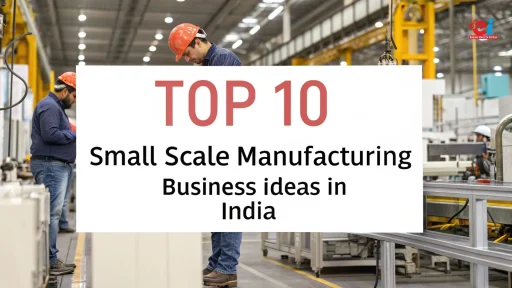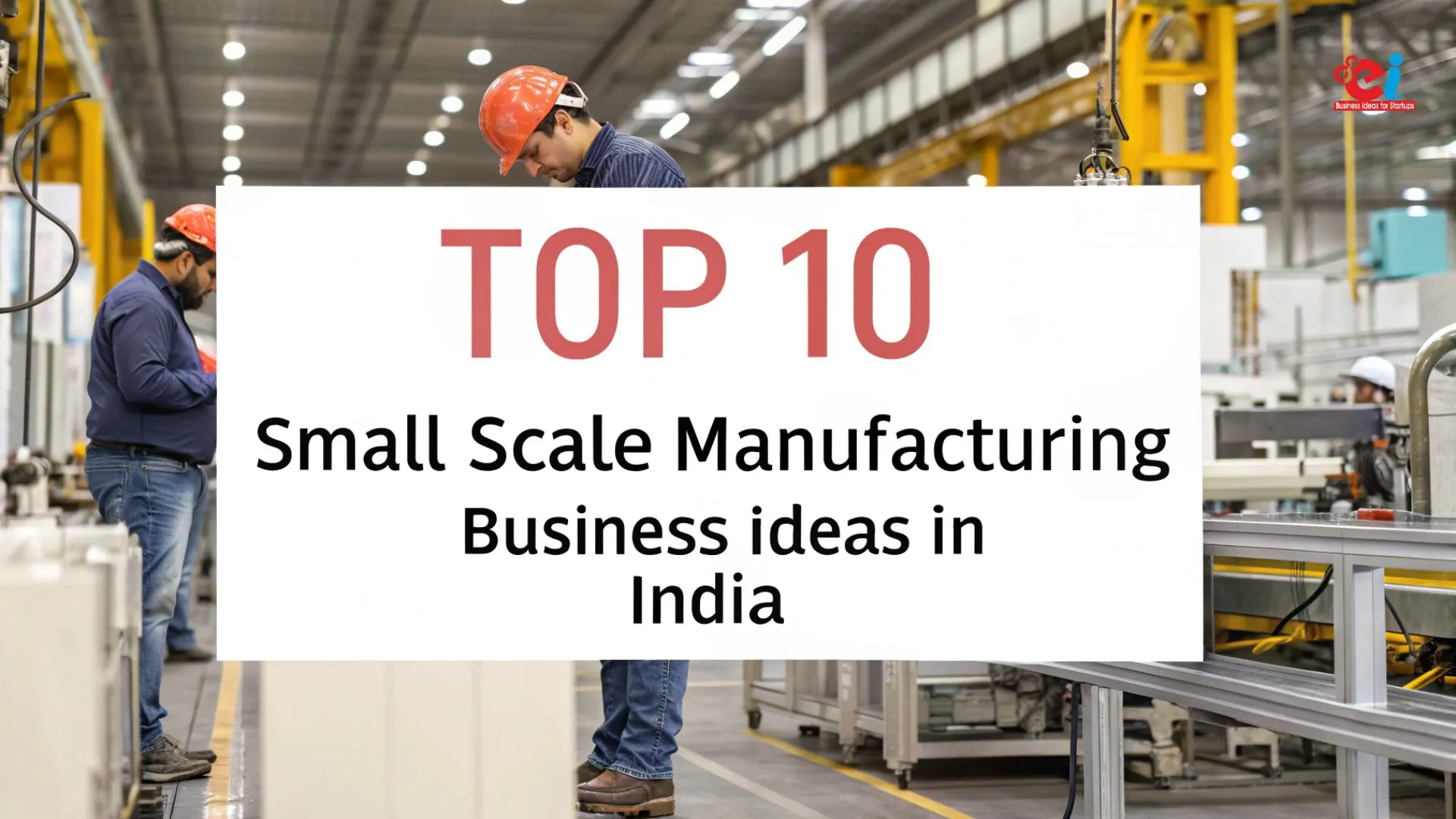Manufacturing is the New Frontier for Indian Startups
The Indian startup industry has developed rapidly in the past 10 years. While tech and digital services dominated the initial wave, a renewed interest is now growing in product-based businesses–especially Best Small Scale Manufacturing Business.
This isn’t a coincidence. The rising demand for domestic goods, the government’s support for MSMEs, the growing digitization of supply chain and the demand from consumers for local, sustainable products have all provided a great opportunity. Small-scale manufacturing facilities can today provide local markets as well as international buyers.
In contrast to traditional manufacturing that required large amounts of capital in terms of land, workers, and capital, modern small-scale manufacturing could start with no infrastructure, a moderate investment and a high potential for branding. For entrepreneurs of the first generation it’s one of the most effective ways to venture into the production industry with minimal risk and great capacity.
Related: Small Scale Business Ideas That Make High Profit.
India’s Small Manufacturing Boom: Why This Sector Matters Now More Than Ever
The growth of India’s economy in recent years has been driven by a shift toward the self-reliance of local businesses and value generation. The flagship government initiatives — Make in India, Vocal for Local, and Atmanirbhar Bharat are designed to boost domestic production and decrease dependence on imports.
Furthermore, the Indian middle-class is expanding in dimensions and ambitions. The new customer base is willing to pay higher prices for goods that are:
- Locally produced
- Sustainable
- Hygienic
- Customized
This is precisely the area where small-scale producers can prosper. They are able to respond quicker to changing trends, pivot swiftly while maintaining high quality and develop connections with their customers. The market is not dominated by mass-produced products. Niche stories, unique, artisanal or eco-friendly products are gaining loyal buyers, particularly on Instagram, Amazon, and offline exhibits.
If you’re an aspiring entrepreneur and looking for a place to start, here are 10 of the most potent small-scale manufacturing options in India for 2025.
1. Candle Manufacturing: From Mood Lighting to Mindful Living
Candles aren’t just lighting sources, but are now essential for living. Nowadays, people use them for meditation, relaxation as well as gifting and luxurious decoration. Soy and scented candles are particularly popular with urban people, and festivals seasons increase the demand for them.
Candles can be made at home, using only the most basic tools. It is possible to start with just some molds, wicks and oils along with glass jars. Because branding plays a significant part, the packaging and story around the candle (e.g., “lavender for sleep,” “marigold for Diwali”) can add significant value.
The possibility to personalize — through smell and shape, as well as labels and packaging – makes this a company with high margins for profit and a strong potential for e-commerce.
2. Spice Powder Manufacturing: Preserving Flavour, Building Trust
Indian food is impossible to imagine without spices, however today’s consumers are more conscious of the cleanliness, quality, purity, and the quality of packaging than ever. This opens up a market for local spices.
A small-scale spice processing plant can produce curated masalas such as garam masala and sambar, pav bhaji masala, as well as turmeric in a neat brand-name format. With the proper grinding, blending along with packing tools, you can create an indigenous spice brand that blends traditional recipes with high-quality standards.
Aim to attract health-conscious consumers by highlighting purity, non-adulteration and traditional hand-pounded methods. The market is huge, evergreen and increasing, especially in the urban and NRI segments.
3. The Paper Plates and Biodegradable Disposables: Green Business with a Volume Demand
In the wake of India’s restriction on single-use plastics, the demand for environmentally friendly disposable alternatives has increased. From caterers and food stands to wedding planners and delivery kitchens, all require biodegradable alternatives.
Making paper cups and plates is a process that relies on machines, however it doesn’t require a lot of labor or space. Machines run semi-automatically and can be used in shifts. It’s a game of volume and if you are able to provide at a reasonable cost and with the right quality, it will never be a problem to run on clients.
Tie-ups with food delivery firms, party planners and event vendors can provide ongoing agreements.
4. Handmade Soaps: The Rise of Natural Skincare
Today’s consumers want more than just clean skin. They need chemical-free, customized and scented skincare products. Handmade soap ticks all of these boxes. Ingredients like goat milk, charcoal, aloe vera and neem not only cleanse but also nourish.
The process of making soap is based on cold-processed soap or glycerin bases, molds, essential oils, and natural ingredients. There are a myriad of soaps that target acne, anti-aging, baby-safe or even Ayurveda-inspired.
With a well-designed packaging and solid brand identity, handmade soap companies can be able to command the highest prices, particularly through boutique shops or Instagram-based shops.
5. Detergent and Liquid Cleaner Manufacturing: Clean Demand, High Repeat
Dishwashing fluid, detergents and toilet cleaners are a part of a household’s weekly purchase. The manufacturing process is straightforward and scales quickly using basic tools and mixer tanks.
It is possible to create organic, herbal or fragrance-free alternatives that appeal to the specific needs of customers. The key is to provide high-quality products and a competitive price.
Local kirana shops, wholesale dealers, as well as small-scale retailers are typically willing to sell local brands when the product’s performance is satisfactory and its packaging appeals to customers.
6. Agarbatti (Incense Stick) Production: A Fragrance that Sells Daily
India is among the biggest manufacturers and users of Agarbatti. The sticks are used in ceremonies of religious significance, meditation, yoga as well as in everyday rituals. They cost little to produce, but they can provide decent margins if they are branded and packed properly.
The process involves making a paste, then rolling it onto bamboo sticks and drying and then scenting. There are machines available to produce semi-automatically. The widespread usage of incense on both trade and in the domestic market makes it an ideal choice for entrepreneurs who want easy-to-use, low-risk products for everyday use.
Related: Start Your Profitable Agarbatti Business with Low Investment
7. Processing and Bottling Honey: Nature-Based Sweetness with Market Buzz
India produces large amounts of raw honey, however most of it is unbranded and not processed. The process of processing and bottling honey opens the doors to organic, wellness and gourmet food categories.
The process involves the process of heating, filtering, and checking for moisture content and bottling in clean conditions. Honey variants can be launched made with cinnamon, tulsi or ginger. These are ideal for gifting as well as urban markets.
With the increasing awareness of the importance of natural immunity and health, the consumption of honey is rising. A small amount of honey can be sold to both export and domestic markets, provided that the quality and packaging conform to the standards.
8. Eco-Friendly Packaging Products: The Next Big Shift in FMCG
As companies opt to go plastic-free, packaging is going through a transformation. Companies are looking for jute baggies, paper bags, cardboard boxes and molded pulp trays to meet sustainability targets.
Paper bags can be made by using manual or automatic machines, or even personalized with logos for restaurant chains, retailers and boutiques.
The growth of D2C bakeries, brands, and online sellers is creating the need for thoughtful, well-branded packaging. This sector also aligns with CSR and ESG goals, making it attractive for B2B partnership opportunities.
9. Organic and Millets-Based Snack Manufacturing: Nutrition Meets Convenience
Healthy snacks are among the fastest-growing segments in India. Items like millet puffs that are roasted, seeds, energy laddus and low-GI namkeens are replacing sugary and fried choices in homes with urban.
Start with the basics of roasting, blending, or vacuum sealing equipment. Be sure to focus on benefits that are functional such as gluten-free, diabetic-friendly, nutritious, and child-safe.
Certification from FSSAI, strong packaging and a story-driven brand (such as “from grandma’s kitchen” or “locally sourced”) can aid in gaining loyal customers on the internet as well as in high-end retail stores.
10. PVC Banner and Flex Printing: The Demand for Flex Printing is Booming from Political to Retail
From political rallies and estate advertisements to birthday parties and shop signs, PVC banners and signs will never be out of fashion. If you’re a skilled designer or have the ability to engage an operator for your digital printer, this is a rapidly growing business.
Clients usually require fast turnaround and delivery to their local area—something that large printing firms typically do not provide. A small unit with a wide-format printer could be used by shops, schools, events, as well as marketing agencies.
Margins are stable and your network grows into your most powerful growth tool.
Choosing the Right Idea: Strategic Fit Matters
The right manufacturing strategy isn’t about merely focusing on trends, it’s about alignment with your place of work as well as your skills, passion and accessibility to the resources. For instance:
- If you’re located in a rural location where bees are plentiful, honey processing could be your thing.
- If you’ve got a creative background, candles or flex printing could be more suitable for you.
Begin by evaluating local demand, availability of raw materials, compliance requirements, and the competitive landscape. Start by testing small batches, gather feedback, and gradually increase the size of your business.
For more information check out our Related videos on this Article
How NIIR Project Consultancy Services (NPCS) Can Help You Get Started
Beginning a manufacturing plant, even the smallest one, requires a structured plan. This is the point at which NIIR Project Consultancy Services (NPCS) is available.
- NPCS provides Market Survey cum Detailed Techno-Economic Feasibility Reports for all of the above concepts.
- These reports cover manufacturing process flow, raw materials, layout of the plant, space needs, and projected financials.
- NPCS assists in assessing the feasibility of your equipment, locating suppliers and accessing incentives offered by the government specific to your industry.
Since its inception, NPCS has been the most trusted partner for startups or SMEs across India who are looking to create successful and sustainable manufacturing businesses.
Conclusion: Build More Than a Product–Build a Future
In 2025, small-scale production in India isn’t just about survival. It’s about:
- Sustainability
- Independence
- Long-term growth
Lighting candles, bottling honey, or packaging eco-friendly products—you’re not just creating things, you’re:
- Creating identity
- Providing jobs
- Contributing to India’s economic success
These 10 ideas aren’t only profitable—they’re valuable, scalable, and future-ready.







